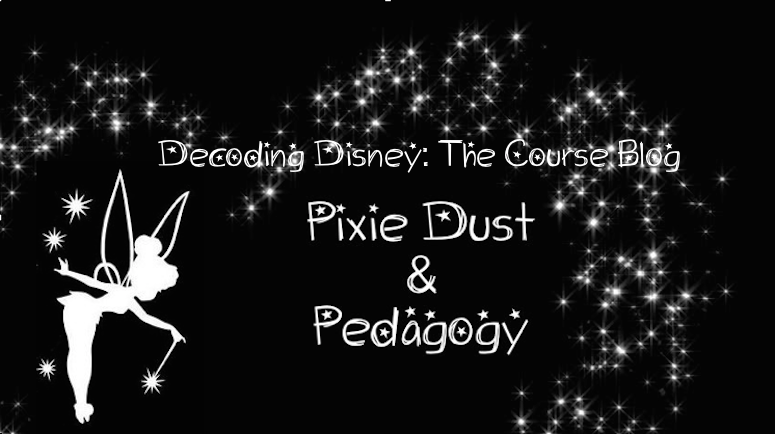I read it for the first time in the Fall of 2015, when I found out I was pregnant with my daughter. I had been mulling over the idea of a Disney-Princess focused course and, after reading the book, I revamped my entire course in a few weeks. It was all well and good to read Orenstein's thoughts and experiences, but I wanted to discuss it, to talk through the details of her argument, to see what other educated, intelligent individuals thought. And I am so lucky to teach at a university where my students (for the most part) really do engage and grapple with ideas like these.
Since my daughter was born, I've found myself returning to her ideas over and over again, wondering if and when Orenstein's ideas will start to apply to her. Some of her points already resonate with me more than they did the first time I read the book -- and I imagine that as my daughter gets older, and as I continue to reread the book, different points and ideas will strike me as relevant.
For example -- in Chapter 3, "Pinked," Orenstein ponders the question, "Why has girlhood become so monochromatic?" She muses, "It's not that pink is intrinsically bad, but it is such a tiny slice of the rainbow, and, though it may celebrate girlhood in one way, it also repeatedly and firmly fuses girls' identity to appearance" (34). She points out that "children weren't color-coded at all until the early twentieth-century" and that, even then, pink was associated more with boys (it was a "muted" version of the powerful red) and blue was more of a girl's color (which is why Disney's Wendy and Alice wear blue dresses). All of this leads up to a discussion of Sesame Street's introduction of Abby Cadabby in 2006:
 |
| From L to R: Abby, Zoe, & Rosita |
But Abby? Clearly female. And here are Orenstein's thoughts:
"Workshop executives have denied they created Abby with a licensing bonanza in mind; the fact that she is so infinitely marketable, that she dovetailed precisely with the pink-fairy-princess megatrend among girls, was apparently a merely happy coincidence.[...] At every geographic outpost from Disneyland to Sesame Street, executives described the same "taboo-breaking" vision, with an identical self-righteous justification about 'honoring the range of play patterns girls can have.' All this pink-and-pretty, they claimed, was about giving girls more choices, not fewer." (41)Orenstein's point is what she identifies as the "pink factor" -- this idea in corporate marketing that if you make a regular item, and then you make it in pink, girls will want the pink version. Like the Little Tikes Cozy Coupe:
The "traditional" one is the red and yellow one--but of course there's a pink version (for girls). There's also a pink princess version that has glitter because...why not?
Me being me, I've pretty much refused to have the pink version of things in my house if there's a "boy" color available (which is usually not overly blue, but more primary colors). My daughter has the red car and loves it. Because primary colors are not inherently masculine and pink is not inherently feminine. And I'm pretty sure she doesn't care what color her toy is -- she just loves that she can ride around in her car like Mommy and Daddy.
So when we first turned on Sesame Street -- in a moment of desperation because my newborn son was crying and I needed something to distract my daughter -- I'll admit that I was curious as to which characters she would be drawn to: would Abby be her favorite just because she was "the girl" or the pretty pink fairy?
The answer? Nope. Not even a little bit.
Her favorites, in order, are:
(1) Elmo
(2) Cookie Monster (although he's a very close second -- and depending on the day, he might be first)
(3) Grover
(4) The Count
(5) Big Bird (or, "Duck" as she calls him)
(6) Abby
And I really think Abby is only on the list because she's so heavily featured. Elmo is definitely her favorite: while he's featured the most, I also think there's something about his character that speaks to toddlers. She loves Cookie Monster because -- well? Who doesn't? He OmNomNomz cookies! And The Count is so high up because of the counting segment where they encourage kids to stomp along.
Maybe when she's older, her favorites will change -- and maybe it will be because of gender differences. But right now? I'd like to think that, like me, she doesn't think monsters and muppets have genders. Elmo is just the red monster who laughs and dances a happy dance when he learns something new. Cookie Monster is just the blue monster who loves to eat cookies (again, who doesn't?). And Abby is just the pink monster with wings who waves a magic wand around.
Right now, Elmo is the stuffed animal she places on her chair each night before bed (along with Beast, but that's a different post) so she knows exactly where it is the next morning.




